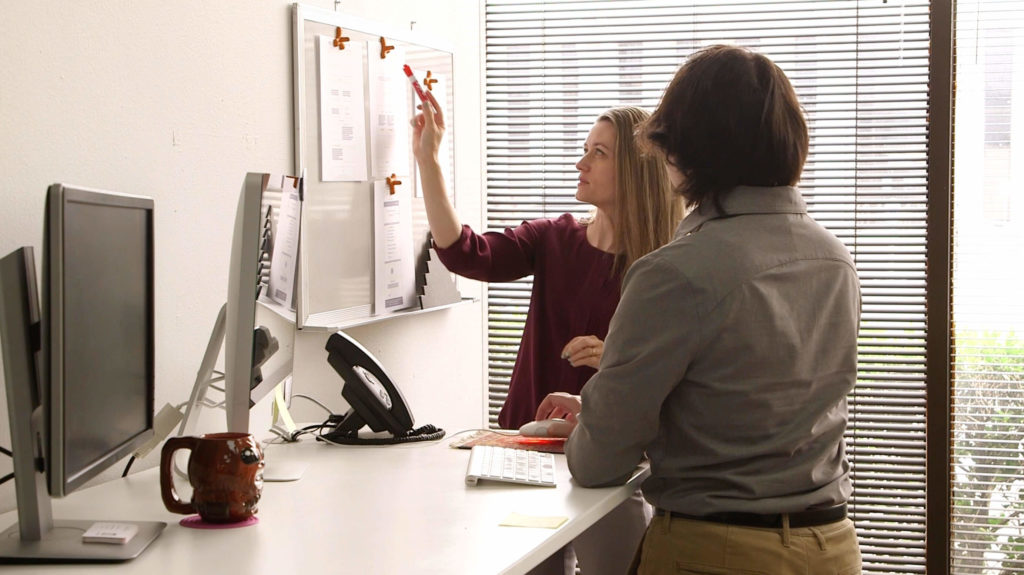
Despite your level of experience in communications or marketing, website projects may cause you to run in the opposite direction. Of course, web development can be intimidating, but stories of failure with past web developers are also far too common. Fear not, because your digital gloom can have a rainbow in its future! The key is to plan a successful, collaborative relationship with your web developer.
1. Confirm your website goals.
Whether you are designing a simple customer-facing website or a complicated custom web application, you must understand your goals. Before you attempt to venture into a website project, outline the purpose of the website. Your vision should be clear. This does not mean that you need to know exactly what the website will look like. Those details will come out later, during the actual design process. You are simply defining things like:
- What is the reason for needing this website?
- How critical is this website for your organization?
- What kind of impact does the website need to have to be considered successful?
By bringing these decisions to the table at your first web development meeting, you are setting clear expectations.
2. Define roles. Who owns what?
If you don’t already realize it, there are many different elements that go into building a website. For example, graphic design, front-end coding, back-end web development, testing, and content.
For each totally different website out there, there is a totally different web developer. I am not referring to “good” or “bad” web developers; it is just normal for each vendor to have different skill sets and offerings. Instead of assuming every aspect of the website will be handled by a certain person, confirm who will “own” each leg of the project.
In many of the projects I participate in, the company’s internal team provides a lot of the content. Yet in others, they require a copywriter to help build out new web pages. Some businesses have an in-house graphic designer providing mockup designs for hand-off, while other businesses want their web development company to handle all of the design.
These are important things for your web developer to know upfront. Your overall project will flow more efficiently when every actor knows their scene.
3. Communicate beyond the kick-off meeting.
Imagine you are starting a new, exciting web design project. You have a kick-off meeting with your web developer, talk about those amazing goals you laid out and all of the wonderful wins you look forward to. If this is the last time you communicate about the website, you could be setting yourself up for disappointment.
It’s true that many web developers get to work in a quiet space, while drumming up beautifully programmed web pages without question. But what if that quiet time is weeks and weeks long? There are many phases to building a new website and things can evolve. Without checking in frequently on progress and questions, the whole project can derail.
A good rule is to schedule regular meetings at milestones of the project. But that is just the beginning. Also very important, both parties (the site owner and the web developer) should be giving feedback and answering questions promptly. If you wait to express your concerns about mockup designs, the designer’s availability may change. If you do not provide updates about your web page content, it might be very difficult for the web developer to understand how to finish the structure of those web pages. The web developer will also be more successful if they promptly provide you with communication updates, so set this expectation in your relationship.
4. Be part of the review and testing process.
Quality assurance and testing are important parts of a website project. Your web developer should be testing and fine-tuning the website for quality functionality. However, the website owners and editors have a perspective that is extremely helpful. Also, many people are more hands-on and visual thinkers, and will provide more useful feedback when they are involved in testing. Plan to collaborate with your website creator in this way. You can be a meaningful contributor to the successful launch of your new site.
5. Stay on course.
Even for simpler website projects, surprises can be an issue. Whenever possible, stay on the same course as your original outline for the project, and keep the same stakeholders. It is challenging for web professionals to make major changes in the middle of a project. This commonly happens when a new person suddenly becomes involved, when the organization’s mission unexpectedly shifts, or when the resources that were promised are not delivered. Stick to the plan, and minimize surprises.
- Avery Bradt - June 30, 2025
- Jen Rios - October 16, 2023
- Sarah Parker - April 1, 2023

